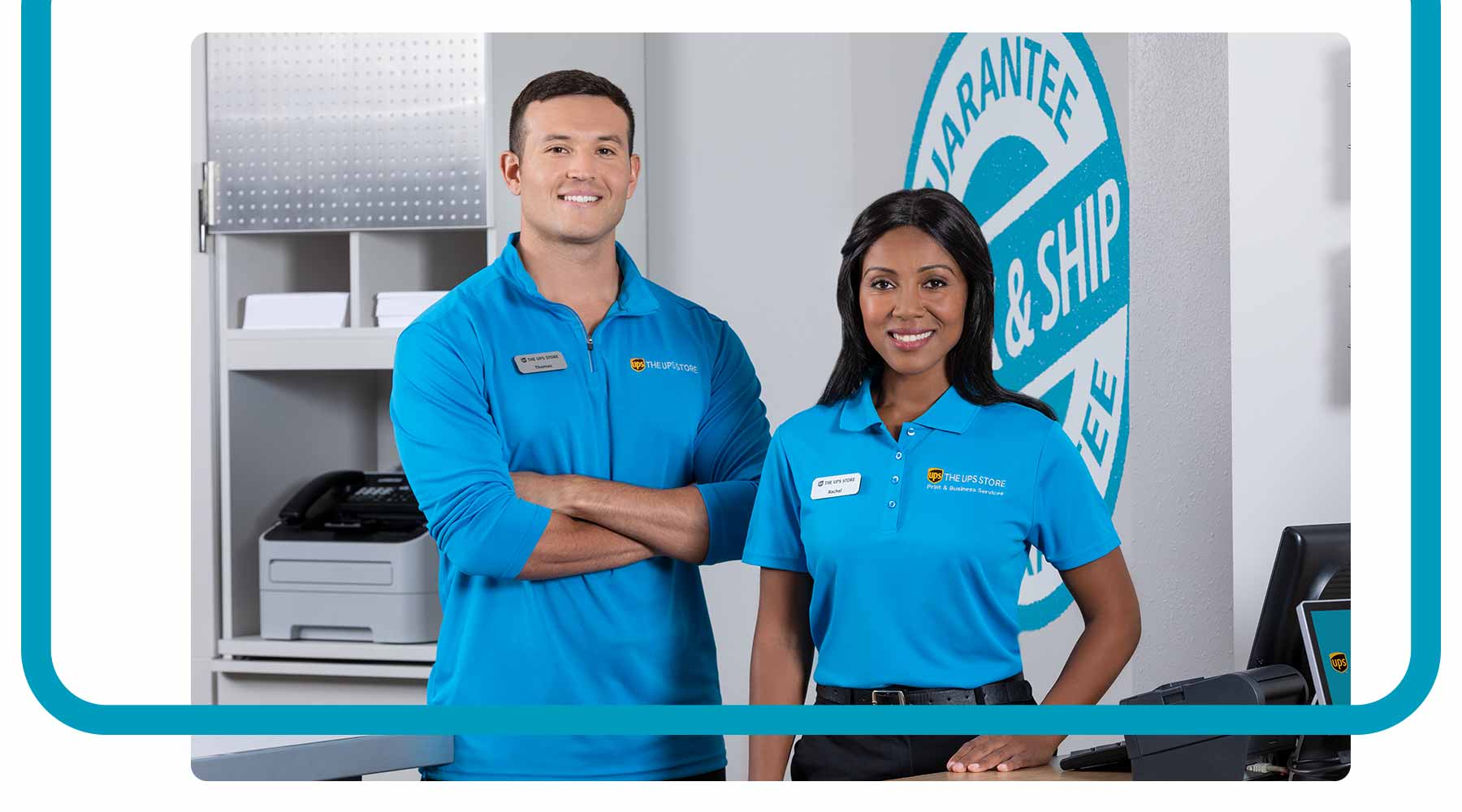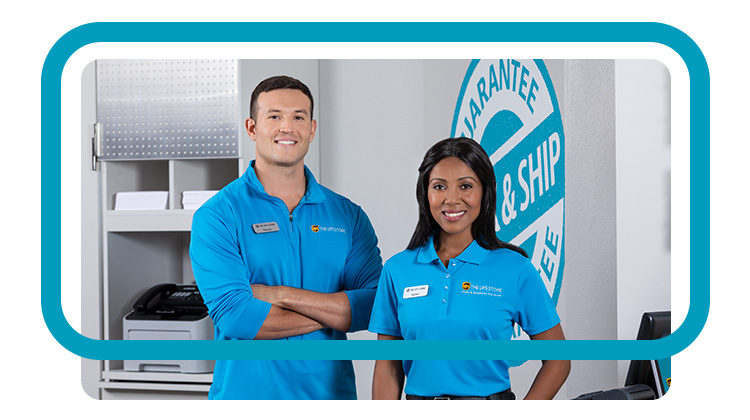Frequently Asked Questions
We've learned what works through our 40 years of franchising experience. Browse FAQs about The UPS Store® franchise opportunity and take the next step toward becoming a franchise owner.


Get the Answers
How much does a franchise cost with The UPS Store, Inc.?
As stated in item 7 of our current Franchise Disclosure Document (“FDD”), the typical initial investment when opening a new traditional The UPS Store® center is estimated at $216,417 to $608,975. See our purchase page for more information about other center types.
Does The UPS Store, Inc., offer franchise finance options?
No, we do not offer any finance options in-house. We have relationships with preferred lenders who can offer you competitive and flexible financing options. Review business financing options with your business advisor.
How much are franchise royalties with The UPS Store® franchise?
As indicated in our current Franchise Disclosure Document, The UPS Store, Inc., collects 8.5 percent of franchise owners’ adjusted gross monthly sales, five percent of which covers royalties and 3.5 percent of which goes to local and national marketing efforts.
*See Item 5, 6, and 7 of our FDD for more information on these fees and a description of other fees not listed here.
What are the financial requirements to start a The UPS Store® franchise?
The total investment to open your first traditional The UPS Store center ranges from $216,417 to $608,975. See item 7 of our current Franchise Disclosure Document (“FDD”). Prospective franchisees must demonstrate the financial ability to support the total investment. A qualified co-applicant may assist in meeting this requirement. If this requirement cannot be fully met through liquid assets from a non-borrowed source, prospective franchisees are responsible for securing financing for the remaining investment amount.
Initial Qualifications
Good or Excellent Credit
Minimum Cash Contribution: $100,000-$150,000
Minimum Net Worth: $250,000
Does The UPS Store, Inc. offer special franchise opportunities for Veterans?
The UPS Store, Inc., wants to help Veterans realize the dream of franchise business ownership, so we offer an approximate 50% discount on initial franchise fees for qualified Veterans. See our Inclusion & Belonging page for more information about available programs.
Are there The UPS Store® franchises for sale near me?
The UPS Store, Inc. has several available franchise opportunities in markets across the country, including existing centers and open markets for new locations. View our available markets to search for locations in your area.
What are The UPS Store® non-traditional locations?
View our non-traditional page for more information about venue types.
What support and training does The UPS Store, Inc. provide?
Training: a comprehensive, multi-phase training program to give new franchise owners the tools, strategies and knowledge they’ll need to launch and grow their businesses. Training new franchise owners on our company and business model empowers franchisees to train their staff confidently and effectively, open and operate the center, understand the importance of the physical retail location and be equipped to make sound business decisions in a wide variety of circumstances.
Learn more about Training & Support for franchise owners with The UPS Store, Inc.
Marketing: Advertising support to help franchisees promote and grow their business. Ongoing national advertising campaigns, along with regional and local advertising and marketing campaigns designed to build awareness in the local community and help drive customers to franchise locations.
Support: Initial, pre-opening support includes assistance with site selection and lease negotiation. Our toll-free Help Desk will be available to answer any pressing technology questions or assist with requests. A network of more than 5,300 The UPS Store® franchisees in the U.S. that you can reach out to or visit with, who are eager to answer any questions you might have, provide general business guidance and offer strategies for running a location. Our regular e-newsletter will help you stay up-to-date on what’s going on with the brand and at other centers across the country.
Can I own more than one The UPS Store® location?
Yes, multi-center opportunities are available for qualified franchisees. We love having qualified franchise owners expand their business by opening additional The UPS Store® centers, and many franchisees own more than one location.
What are the products and services offered at each The UPS Store® center?
As a franchise owner with The UPS Store, Inc., you’ll offer a range of products and services to individual consumers to small business owners, including the following:
- Professional Printing Services: printing business cards, letterhead, posters, flyers, direct mail postcards and more
- Direct Mail Services: helping local businesses get the word out with direct mail promotion
- Mailbox Services: assisting customers with all their mailbox needs
- The UPS Store Certified Packing Experts®: packing and shipping everything from letters to more substantial (i.e., heavier or bigger) items
- In-Center Services: providing a variety of in-center services like computer access, notary services, passport and ID photos, shredding, office and mailing supplies and design services
- Small Business Services: serving local businesses in your area with support services
Learn more about The UPS Store®.
Do I need a green card/work visa to obtain a franchise?
Yes, if you are not a U.S. citizen, you will need a valid visa permitting you to own and operate a business in the U.S., as an additional qualification for a The UPS Store® franchise. We recommend that you consult an immigration attorney for more information and guidance.
Can I open a The UPS Store® franchise with no retail experience?
Yes, you can.
Many franchisees begin with no direct retail background. What matters most is your entrepreneurial mindset and willingness to follow a proven system. The UPS Store provides robust initial training and ongoing support to help franchisees learn the ropes and thrive with operational coaching, mentoring and structured onboarding.
Can I keep my current job while starting a The UPS Store® franchise?
The UPS Store® franchise model is designed for active, hands-on ownership. While some candidates explore transitional approaches early on, ongoing involvement in daily operations is typically expected. A Franchise Development Manager can help you evaluate whether this aligns with your goals and availability.
What are the most common challenges new franchisees face?
Some early challenges include:
- Building awareness in the local community
- Hiring and managing qualified staff
- Learning day-to-day business operations
The UPS Store® network offers support in these areas:
- Local marketing resources and digital advertising tools, including center websites
- Training courses on business management
- Dedicated franchise consultant and field support, opportunities for peer mentorship and networking
How does site selection work for a new The UPS Store® location?
After preliminary approval, The UPS Store, Inc. provides assistance with site selection and lease negotiation to help our franchise locations meet the needs of the local community.
What marketing support is included with a The UPS Store® franchise?
Franchisees benefit from national advertising campaigns as well as regional and local marketing efforts. Support may include:
- Localized advertising materials
- Center-specific websites
- In-store promotional collateral
- Public relations efforts and seasonal campaigns
- Resources to help promote your center within the local community
Can I convert an existing business into a The UPS Store® location?
Yes.
Entrepreneurs with an existing independent business offering similar services to The UPS Store® network may explore conversion opportunities, subject to brand standards and operational requirements. A Franchise Development representative can guide you through eligibility and next steps.
What’s the difference between traditional and non-traditional The UPS Store® locations?
Traditional locations are typically retail storefronts in shopping centers or plazas. Non-traditional sites may include colleges, military bases, hotels and grocery stores — each designed to serve specific audiences with the same core services. Availability varies by region and space.
What are the steps after submitting the Franchise Application?
After you submit the franchise application, a Franchise Development Manager will contact you for an initial interview and provide the Franchise Disclosure Document (FDD). From there, you'll go through a due diligence period, franchise application process, financial qualification and a final executive interview. If preliminarily approved, you’ll begin site selection and development with support from The UPS Store® franchise team.
For a detailed breakdown, visit our Franchise Process page.
What is the margin and profit of owning a The UPS Store® location?
We encourage reviewing the Franchise Disclosure Document (FDD) with a qualified advisor to understand the financial considerations involved. The UPS Store, Inc. does not share information regarding actual or potential financial performance of its franchised centers outside of the FDD.
